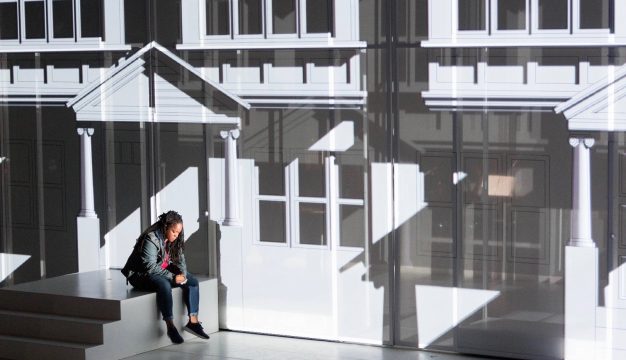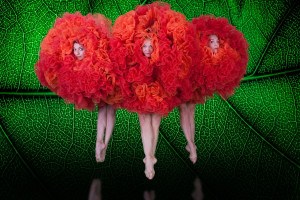O Festival Diary—Day III: We Shall Not Be Moved

Lauren Whitehead in We Shall Not Be Moved at the O Festival. (Photo by Dominic M. Mercier)
Between September 14th and 25th, Opera Philadelphia will boldly go where few, if any, companies have gone before—a festival that brings seven events covering the broad spectrum of opera, and in some cases pushing it into the future. There are traditional works (Mozart’s Die Zauberflöte at the Academy), new voices (We Shall Not Be Moved, which adds hip hop and spoken-word to the mix), big stars (reigning Met diva Sondra Radvanovsky in concert), and unusual venues (including the Philadelphia Museum of Art and the Barnes). I’ll do my best to cover as many of these events as I can. You can also find more information about the O Festival on their website.
We Shall Not Be Moved is another world premiere—yet it will be chillingly resonant to Philadelphians old enough to remember the source material. I arrived here in 1990, five years after the MOVE bombings and fire that destroyed a neighborhood—but the incident still dominated conversation and the general political landscape. My office was just a couple of miles away, something I thought about often.
Tonight, hearing this multimedia work—by composer Daniel Bernard Roumain and librettist Marc Balmuthi Joseph, directed by Bill T. Jones, with scenery and projections by Matt Saunders and Jorge Cousineau—it struck me as a masterful series of collages. We Shall Not Be Moved mixes musical styles and genres—I thought of Act I as almost an oratorio or requiem, while Act II feels very much a piece of theater. It blends fact and fiction. It’s a nail-bitingly urgent story about the present, and a ghost story about the past. The nature of time itself is part of the collage—the story begins before the bombings and continues after it, and it’s not always clear exactly when individual scenes take place. We see it too in the scenery, a series of Philadelphia row houses that change in detail, but fundamentally remain as a structure.
All of this serves to underscore the disheartening truth that the issues here began long ago, and they’re still with us. The piece itself will likely stay with you long after the powerful final image fades.
We Shall Not Be Moved is brilliantly staged and performed, and I found it grew in power throughout the evening. The ensemble cast of singers, dancers and actors is excellent, with the two principal women—Lauren Whitehead as Un/Sung, one of the local residents, and Kirstin Chávez as Glenda, a police officer—especially strong. But the standout for me was John Holiday, whose supple, beautiful countertenor and poignant acting really carried the night.
It’s hard to know whether the work, powerful as it is, will have a long afterlife beyond this festival. The story has deep meaning here (where of course it also remains politically controversial), but it may not have the same impact elsewhere. The resources here are exceptional—I’m not sure they could be duplicated.
These are the kinds of questions critics typically think about, and frankly I’m not sure that this work isn’t beyond the scope of normal criticism. The very idea of a review feels inadequate to the weight of this topic.
What I do think is it’s wonderful and vitally important that the O17—a festival that celebrates a Philadelphia Institution and its continuing rise—has made We Shall Not Be Moved one of the central works in that festival. It acknowledges our history, faces its consequences, and insists we can be better.
After the last two O17 shows, I was excited to be a music critic in a city with a vibrant opera scene. Tonight, I was proud to be Philadelphian.


